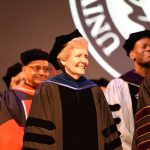The University of Connecticut will start offering what is believed to be the only full teacher preparation program in Mandarin Chinese in January. Already with what officials say is a robust World Language program, UConn would include Mandarin to a program that already turns out teachers of French, Spanish, German, Italian and Latin.
Kristi Carriero has been named Assistant Principal of New Canaan High School. She will begin her new position on July 1.
The Milford Board of Education appointed seasoned educator Anna Cutaia as superintendent of schools. Cutaia, superintendent of schools for Regional District 14, which encompasses Bethlehem and Woodbury, and former director of elementary education in Fairfield, will take the reins of the city’s school system around Aug. 1.
“It’s a moral hazard issue — a devil’s bargain,” Preston Green, a professor of education leadership and law at the University of Connecticut, said after reviewing the contract between the school and K12. “These districts need the money, are responsible for these students but the students are not a part of them. The question becomes: How concerned is the district going to be? It just doesn’t have the incentive to focus on these students. They’re just dollars to them.”
“A recent national survey reported that millennials are struggling with their knowledge of the Holocaust,” says Alan Marcus, associate professor of curriculum and instruction at the Neag School. “The survey results show that 22 percent of millennials have not heard of, or are not sure if they have heard of the Holocaust, and that 66 percent could not identify Auschwitz.”
“As a scholar of Holocaust education and teacher education, I argue that knowledge of specific facts is only a small part of knowing about any historical event, including the Holocaust.”
Del Siegle, professor and associate dean for research and faculty affairs at UConn’s Neag School of Education is interviewed about his career and expertise in gifted education by National Association for Gifted Children (NAGC) member and Neag School alum Carla Brigandi ’15 Ph.D., now assistant professor of gifted education at West Virginia University.
Following an extensive search, the Westport Public Schools is pleased to announce the appointment of Dr. Tina Mannarino as an Assistant Superintendent for Pupil Personnel Services. She will officially start the position July 1.
Recently Morgaen Donaldson and Shaun Dougherty presented early results from their IES-funded study on principal evaluation policies at the AERA national conference.
The superintendent named new principals for Manchester High School and Illing Middle School, both familiar faces. Katelyn Miner, who has been serving as the high school’s interim principal since August, was appointed to the permanent position, Superintendent Matt Geary wrote in a letter.
Mary Anne Doyle began her career at the University of Connecticut’s School of Education in 1983 as an assistant professor. She will retire this month after a 35-year career as an administrator and faculty member.

